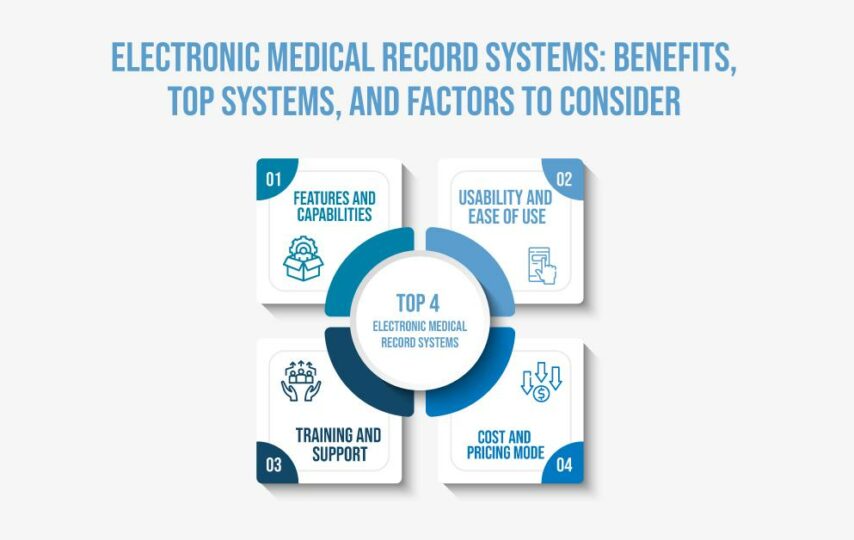An Electronic Medical Record (EMR) system is a digital record-keeping system that stores patient medical and treatment information electronically. A more effective and secure electronic version of the conventional paper-based medical records is substituted by this system. EMR systems often contain a variety of patient data, such as medical history, diagnosis, and treatment plans, as well as information on drugs, allergies, vaccines, and results of laboratory tests. The system’s goal is to raise the standard of medical care by giving healthcare professionals quick and simple access to complete patient data. EMR systems also make it easier for healthcare professionals to communicate with one another, including doctors, nurses, and pharmacists, and they offer a platform for the safe and correct transmission of patient data.
There are a number of EMR systems on the market at the moment, each with its own set of features and advantages. In this article, the most well-known EMR platforms—including Allscripts, eClinicalWorks, MEDITECH EHR, NextGen Healthcare, Athenahealth, Greenway Health, Practice Fusion, and Kareo—are briefly discussed. You will be able to choose the EHR system that is best for your medical practice once you have a better grasp of the advantages and disadvantages of each one after reading this article.
How can Electronic Medical Record Systems enhance your practice?
Electronic Medical Record (EMR) systems can enhance medical practices in several ways, including:
- Improved efficiency: EMR systems eliminate the need for paper-based record-keeping, reducing the time and effort required to maintain patient records. This can result in improved efficiency, reduced paperwork, and streamlined processes.
- Increased accuracy: EMR systems can reduce errors in patient care by providing accurate and up-to-date patient information. Healthcare providers can access a patient’s complete medical history, including medications, allergies, and previous treatments, reducing the risk of medical errors.
- Improved patient care: EMR systems can improve patient care by enabling healthcare providers to access and share patient information quickly and easily. This can result in faster diagnosis and treatment, improved communication between healthcare providers, and better care coordination.
- Enhanced communication: EMR systems facilitate communication between healthcare providers, enabling them to share patient information quickly and securely. This can improve the quality of care by ensuring that healthcare providers have access to accurate and up-to-date information.
- Better patient engagement: EMR systems can enhance patient engagement by giving patients access to their medical records and enabling them to communicate with their healthcare providers. This can improve patient satisfaction and enable patients to take a more active role in their care.
Key factors to consider while purchasing Electronic Medical Record Systems
Choosing the right Electronic Medical Record (EMR) system is important for any healthcare practice. Here are some key factors to consider when evaluating different EMR systems:
- Features and Capabilities: Evaluate the features and capabilities of the EMR system, including clinical decision support, electronic prescribing, revenue cycle management, and patient engagement tools. Look for a system with the necessary features to run your practice effectively.
- Usability and Ease of Use: Consider the usability and ease of use of the EMR system, including its user interface and navigation. Look for an intuitive and easy system for your staff to use.
- Interoperability: Consider the interoperability of the EMR system, including its ability to exchange data with other systems and healthcare providers. Look for a system compatible with your other systems, such as labs, pharmacies, and hospitals.
- Customization and Configuration: Consider the ability to customize and configure the EMR system to meet the specific needs of your practice. Look for a system that can be tailored to your workflows and preferences.
- Training and Support: Consider the training and support offered by the EMR system vendor, including training for your staff and ongoing support for technical issues or questions. Look for a vendor that offers comprehensive training and support resources.
- Security and Compliance: Consider the security and compliance features of the EMR system, including data encryption, user authentication, and compliance with HIPAA and other regulatory requirements. Look for a system that prioritizes data security and compliance.
- Cost and Pricing Model: Consider the cost and pricing model of the EMR system, including upfront costs, ongoing maintenance and support fees, and any hidden costs or fees. Look for a system that is affordable and transparent in its pricing.
By carefully considering these factors, you can choose an EMR system that meets the specific needs of your practice and helps you deliver high-quality care to your patients.
Some famous Electronic Medical Record Systems available in the market?
Numerous Electronic Medical Record (EMR) systems are available in the market today. Some of the top EMR systems like Allscripts EMR, eClinicalWorks, MEDITECH, NextGen Healthcare, Greenway Health and Practice Fusion are addressed in this article so that you can get a clear picture of their features and benefits. So, let’s read further.
- Allscripts: Allscripts is a leading EMR system that offers a range of solutions for different types of healthcare providers, including hospitals, clinics, and private practices. Its features include clinical decision support, electronic prescribing, and revenue cycle management.
- eClinicalWorks: eClinicalWorks is a cloud based EMR system that offers a range of features, including electronic prescribing, patient engagement tools, and practice management capabilities. It is renowned for its simple usage and user-friendly interface.
- MEDITECH: MEDITECH is an EMR system that offers a range of solutions for different healthcare settings, including acute care, ambulatory care, and long-term care. Its features include clinical decision support, population health management, and patient engagement tools.
- NextGen Healthcare: NextGen Healthcare is an EMR system that offers a range of solutions for different healthcare settings, including hospitals, clinics, and private practices. Its features include population health management, clinical decision support, and revenue cycle management.
- Athenahealth: With several features, like electronic prescription, patient interaction tools, and practice management capabilities, Athenahealth is a cloud based EMR system. It is renowned for being simple to use and having an intuitive UI.
- Greenway Health: Greenway Health is an EMR system that offers a range of solutions for different types of healthcare providers, including hospitals, clinics, and private practices. Its features include clinical decision support, revenue cycle management, and population health management.
- Practice Fusion: Electronic prescription, patient interaction tools, and practice administration capabilities are just a few of the features that Practice Fusion’s cloud based EMR system has to offer. It is renowned for being user-friendly and reasonably priced.
- Kareo: Kareo is an EMR system that offers a range of solutions for small and medium-sized healthcare providers, including clinics, private practices, and billing companies. Its features include revenue cycle management, electronic prescribing, and practice management capabilities.
Conclusion
When choosing an EMR system, it is important to carefully evaluate each system’s features, usability, interoperability, customization, training and support, security and compliance, and cost and pricing model. If you are looking for an EMR system for your practice, contact Software Finder at (661) 384-7070 or email info@softwarefinder.com.








